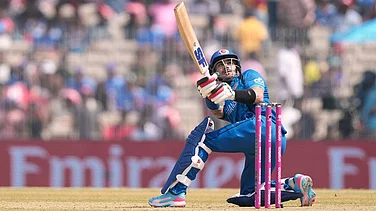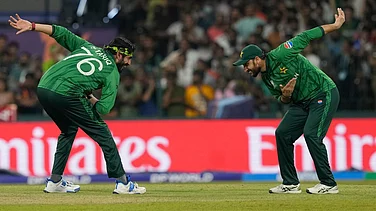The Hockey World Cup trophy is being taken city to city across a major part of India, to get hockey followers and sports enthusiasts into the mood for the 2023 FIH Men’s Hockey World Cup. Getting a close look at the glittering trophy, taking photographs with it are ways of fuelling public interest. Past greats and hockey internationals were invited to these events, for a firsthand feel of the prize to be raised in celebration by the world’s best hockey-playing nation. (More Hockey News)
Indian hockey belonged to that elite category once, via the glitter of gold medals from the Olympic Games (six in a row and eight overall) and one men’s World Cup at Kuala Lumpur in 1975.
For achievers from that 1975 squad under victorious captain Ajitpal Singh, the trophy tour is a grim reminder about under-achievement after glory due to various factors.
Tripped by artificial turf
Ad-hoc decisions by hockey administrators at different times, interference in team matters, hiring and firing of coaches without logic, federation officials beyond accountability for team performance are a few of the issues. As a result, India are still in quest of a second World Cup title.
India forward Ashok Kumar, from the ‘75 Kuala Lumpur batch, was among the greats getting a feel of the World Cup trophy tour in New Delhi’s Dhyan Chand stadium, named in memory of his legendary father.
“Holding the trophy in my hand triggered memories,” he said. “I hope this Indian team is able to win in Odisha and the public can celebrate. It will be a perfect New Year gift to our nation.”
Asked why India could not capitalise on its 1975 victory, the ace forward observed: “The turning point was grass being replaced by artificial turf in 1975. For years, we were playing catch-up with the hockey world, especially since we delayed laying artificial turfs in India. Upcoming players in hockey states like Punjab, UP, Mumbai, Karnataka, Delhi, Bengal etc trained on grass to compete on turf surfaces.”
After 1975, the closest India came to a podium finish in the World Cup was in Sydney, 1994. The team led by Jude Felix and coached by Cedric D’Souza missed a semi-final berth and finished fifth.
Ad-hoc leadership
While the change of surface was a big reason behind India’s decline, it is equally true that federation politics and arrogance damaged the morale and prospects of Indian players.
Coaches Cedric D’Souza and M K Kaushik experienced the iron hand of K P S Gill, then president of the Indian Hockey Federation (IHF), whose tenure was marked by bizarre moves. D’Souza was asked to step down from the coach's post at the 2002 World Cup in Kuala Lumpur midway through the event, in the same city where back in 1975 India had climbed the World Cup summit, and where players and coaches got a heroes’ welcome.
Kaushik, a classic winger and goal-scorer, later national coach of the highest class, received the sack along with six players, even as India won the 1998 Bangkok Asian Games gold, beating South Korea in a thrilling final, and ruling Asian hockey after a gap of 32 years. An achievement worthy of national celebration turned into a disaster.
Why did the Federation act in this manner? Apparently, they took offence to some comments by Kaushik and some senior players. Of course, no explanation was given in public about the logic behind this harsh action. But then, this was a body whose earlier iteration was absurd enough to name two captains for the 1968 Olympics.
Even a decade after the blunders of 1998, things did not improve much. In fact, India did not qualify for the 2008 Beijing Olympics, perhaps the lowest point in Indian hockey history.
Faces in the Federation changed. The Federation too changed its name (Hockey India), but ad-hocism continued. Narinder Batra was treasurer in 2010 when players attending the national camp in Balewadi refused to train in protest against the delay in payment of dues and incentives.
Training resumed after HI decision-makers met with a representative of the striking players in New Delhi. Spain’s Jose Brasa, in charge then and supportive of the players, guided a young, exciting squad to a silver at the 2010 Commonwealth Games in New Delhi and bronze at the 2010 Asian Games in Guangzhou. But a podium finish did not help the foreign coach retain his job.
Change at last
Amidst these controversies came a ray of sunshine in the shape of the Hockey India League in 2013, creating opportunities for local players, coaches to compete against the foreign pros. The HIL has been stalled over non-hockey issues, but the collective experience with franchise teams and foreign league exposure is paving the way for Indians to play smart, contemporary hockey, resulting in a bronze at 2021 Tokyo Olympics under Aussie coach Graham Reid, who is still in charge.
Winds of change are visible, in the results, in the image of hockey, not to mention the Rs 100 crore cash injection into the sport by Odisha. Both the men’s and women’s teams regularly play in FIH events, and national camps are no longer the sorry tales of sub-standard lodging and diet they once were.
For 1975 batchmates like Ashok Kumar, captain Ajitpal Singh and other India greats across teams, invites to enjoy hockey action in Bhubaneswar and Rourkela next month have been sent out. Narinder Batra has moved out, Member of Parliament and ex-India captain, Dilip Tirkey, an icon from Odisha, is hosting the hockey festival as the newly elected federation president. The silver trophy, blessed by a hockey-supportive nation, will be on display by then, waiting for the
Indian team to come up with answers.
The writer is one of the experienced voices on hockey, having covered the sport for several years.





















